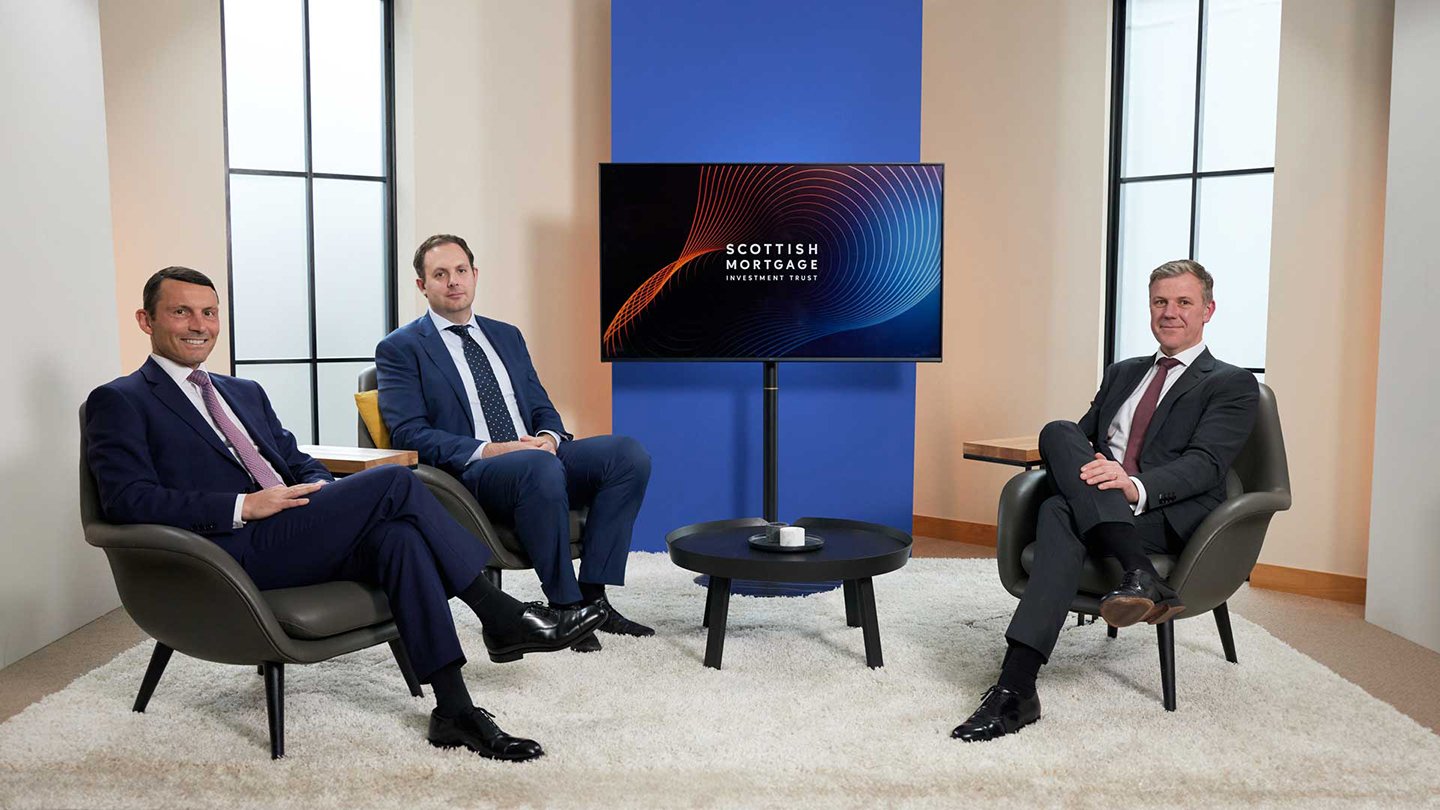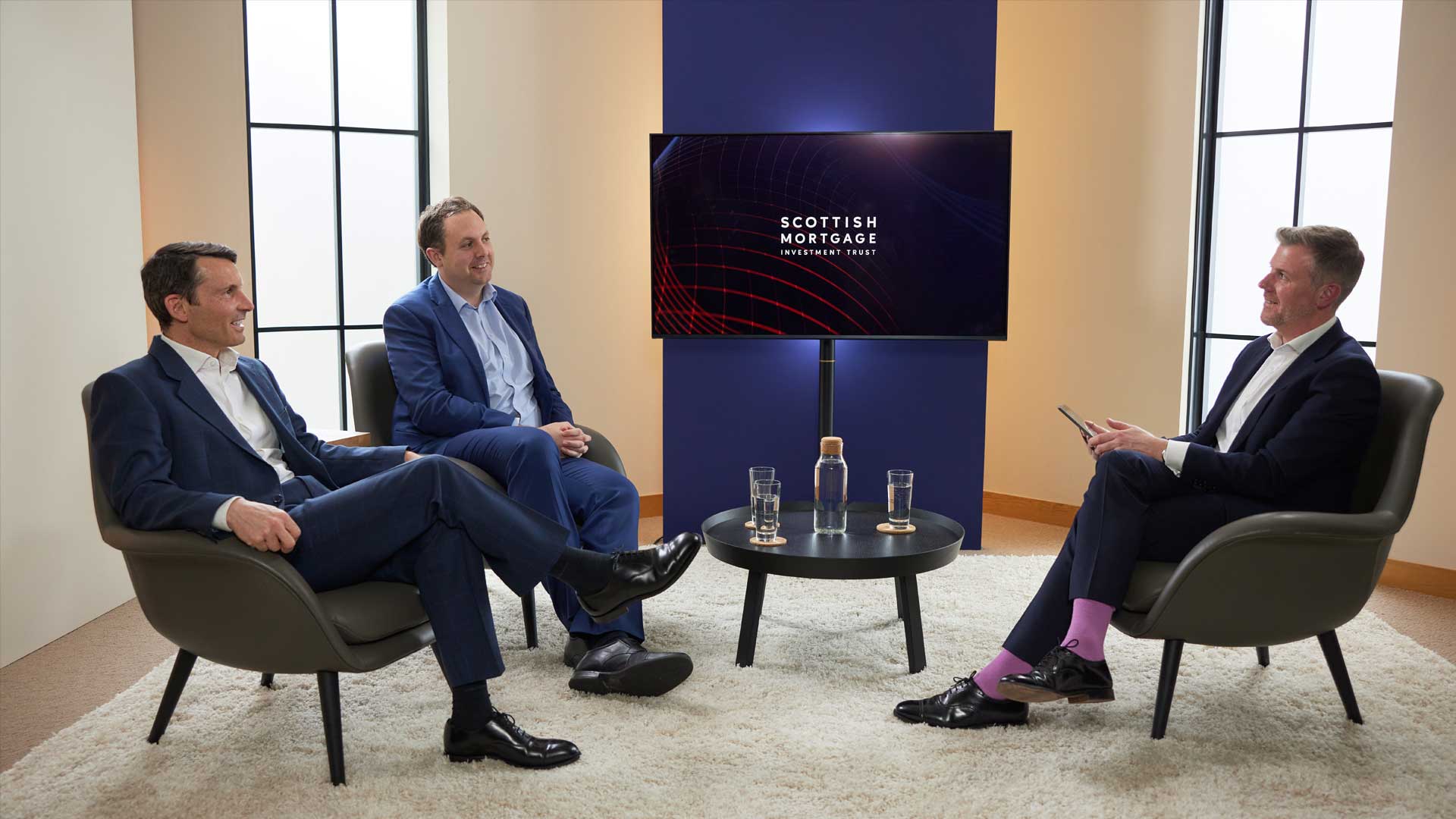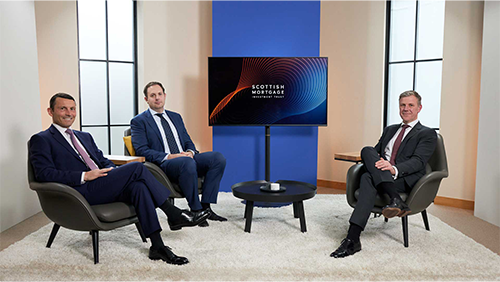November 2023
Article
4 minutes
Investor webinar: written overview
Stewart Heggie – Commercial Director
Key Points
- In a recent live webinar, Tom Slater and Lawrence Burns shared their conviction in the investment trust’s investment style and process
- They answered questions put to them by shareholders about the current market environment, interest rates, valuations and the potential of private companies
- They gave examples of companies held in the portfolio that remain operationally strong and are progressing in their respective fields
As with any investment, your capital is at risk.
During a recent webinar, Scottish Mortgage’s managers, Tom Slater and Lawrence Burns, answered live shareholder questions, and shared their thoughts on topics such as how the current environment affects their investment process – the answer is it doesn’t – company valuations and the potential of private companies.

A recording of the webinar is available here.
They also shared their excitement about the growth potential of companies, such as Moderna, NVIDIA, Northvolt and SpaceX.
The managers continue to focus on finding exceptional companies exploiting large opportunities that have endured despite the poor macroeconomic environment.
Slater, when asked why there hasn’t been changes to the portfolio given recent market conditions, described what the managers are trying to achieve and set shareholders’ expectations:
We don’t know what’s going to happen to interest rates, but we aren’t changing what we do because of what’s happening with interest rates... We believe that the value created by a small number of exceptional companies over the long run is the way to make money. That’s irrespective of the economic conditions, irrespective of interest rates.
That means staying true to the core investment style of Scottish Mortgage, and getting out and meeting with founders, management teams, and industry experts to gain a deeper understanding of the businesses and their potential for growth over the long term.
Both investors visited China in May, and Burns visited some European holdings such as HelloFresh, Spotify, Ocado and Delivery Hero. He has also been in New York, meeting Jensen Huang, the founder of chip maker NVIDIA.
He noted that with the benefit of hindsight, he could see that share prices had run ahead of the fundamentals because of what was happening to interest rates over the past two or three years.
However, he said, “In terms of the operational performances of those businesses, by and large, they’ve been pretty robust, and so what you’ve had is some of the valuation premium come out of those stocks.”

Slater acknowledged, “We don’t like inflicting this type of volatility on our shareholders,” but was upbeat about the long-term possibilities. “There’s nothing that’s changed in the majority of those investment cases,” he said. So, “we see very little to change our minds on the long-run competitive advantages and opportunities that those businesses are going after.”
Burns used the example of Moderna to illustrate this point. Its current share price did not match the breadth of the opportunities across its mRNA medicine platform, including respiratory and personalised cancer vaccines.
They used NVIDIA as another example of a company addressing a vast market. In the valuation context, Slater noted, “This isn’t hype about AI. This is real orders, real dollar strength flowing into the business.”
But, because the managers are looking for companies with massive opportunities when the share price goes up, they must be confident that there are still many opportunities for the company to capitalise on.
In situations such as these, he explained, there are two questions to be answered positively for the company to continue to merit its place in the portfolio. First, has the opportunity also grown? And second, has the company’s likelihood of capitalising on that opportunity increased?
For NVIDIA, the managers agree that the answer is yes for both questions. Burns suggested that:
The advantage of owning NVIDIA is that you can be somewhat agnostic about the different use cases for AI... Whatever the use case of AI, it’s highly likely to need to be trained on a video chip. And about a 90 per cent share of generative AI is trained today using NVIDIA chips.
Having recently met with its founder, he also believes that there are opportunities beyond AI, particularly its ability to redesign the architecture of data centres with its accelerated computing. This could be a one-trillion-dollar market, according to Huang.
The discussion also touched on the potential of private companies, including Northvolt, the European battery manufacturer. Burns highlighted the company's unique position in the market as geopolitical tensions increase the need for Europe to have its own battery supply chain. Plus, it has carbon-neutral credentials.
Another exciting private company is SpaceX, a dominant commercial space launch market player. Slater asserted that its ability to serve a trillion-dollar market with its satellite internet service, Starlink, makes it an attractive investment opportunity.

When questioned on the valuation of private companies, Slater cautioned, “It’s important also to recognise the potential for value creation in these companies. The focus should be on the execution and delivery of opportunities by these businesses, rather than solely on their current valuations.”
The impact of interest rates on growth companies was also discussed. Slater acknowledged that higher interest rates can be challenging for companies but emphasised that the value created by a small number of exceptional companies over the long run is the key to making money, regardless of economic conditions or interest rates.
It was reassuring to hear that the managers’ focus continues to be on the potential of the portfolio holdings to deliver significant returns over time rather than short-term market fluctuations.
While equity markets may not currently be in growth equities’ favour, this does not justify investment style drift. There is much to be optimistic about – structural changes across many industries create large pools of opportunity for innovative companies to exploit.
The managers have a strong conviction in the breadth and depth of the long-term opportunities open to exceptional growth companies. This, and the scale of the competitive advantage which they believe companies held within the portfolio have, makes them optimistic about the long term.
If you want to explore more of their answers to the hot topics that shareholders raised, a webinar recording is available here.

Scottish Mortgage Annual Past Performance To 30 September each year (net %)
|
|
2019 |
2020 |
2021 |
2022 |
2023 |
|
The Scottish Mortgage Investment Trust PLC |
-6.4 | 97.8 | 45.5 | -45.0 | -13.9 |
Source: Morningstar, Share price, total return, sterling.
Past performance is not a guide to future returns.
Risk factors
The trust invests in overseas securities. Changes in the rates of exchange may also cause the value of your investment (and any income it may pay) to go down or up.
Unlisted investments such as private companies, in which the Trust has a significant investment, can increase risk. These assets may be more difficult to sell, so changes in their prices may be greater.
The trust invests in emerging markets where difficulties in dealing, settlement and custody could arise, resulting in a negative impact on the value of your investment.
About the author - Stewart Heggie
Commercial Director
Stewart Heggie is a commercial director, focused on serving the needs of Scottish Mortgage shareholders. Prior to joining in 2019, he spent 15 years as a discretionary fund manager, before which he helped design the investment platform of a large UK bank. Nowadays, Stewart enjoys a varied role that spans across several areas involved in running a listed investment company. He plays a key role in developing the company’s strategic direction and broadening out its ownership. Beyond that, he works closely with the managers to maintain current portfolio knowledge; regularly meets with potential and existing overseas shareholders; and acts as a key contact for the board of directors.
Important information
This communication was produced and approved at the time stated and may not have been updated subsequently. It represents views held at the time of production and may not reflect current thinking.
This content does not constitute, and is not subject to the protections afforded to, independent research. Baillie Gifford and its staff may have dealt in the investments concerned. The views expressed are not statements of fact and should not be considered as advice or a recommendation to buy, sell or hold a particular investment.
Baillie Gifford & Co and Baillie Gifford & Co Limited are authorised and regulated by the Financial Conduct Authority (FCA). The investment trusts managed by Baillie Gifford & Co Limited are listed on the London Stock Exchange and are not authorised or regulated by the FCA.
A Key Information Document is available by visiting our Documents page.
Any images used in this content are for illustrative purposes only.









